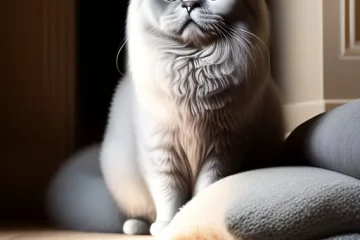If you’re in search of a feline companion that exudes elegance and charm, look no further than exotic Persian cats.
These captivating creatures have long been admired for their unique appearance and gentle temperament.
This article will thoroughly explore the fascinating realm of exotic Persian cats, covering their origins, physical traits, care needs, and additional aspects.
Get ready to embark on a journey to discover the enchanting world of these fascinating feline companions.

Origins of Exotic Persian Cats
These cats have a rich history that dates back centuries.
Believed to have originated in Persia (modern-day Iran), these regal cats were treasured for their striking looks and luxurious coats.
Their distinctive appearance and charming personalities led to their popularity spreading across various continents, eventually making them one of the most beloved cat breeds worldwide.
Physical Characteristics
One cannot help but be captivated by the sheer beauty of exotic Persian cats.
These felines boast a number of unique physical features that set them apart from other breeds.
With their large round eyes, small noses, and expressive faces, they have an almost angelic look.
Their dense, long, and silky coats come in an array of colors and patterns, adding to their allure.
Furthermore, their stocky build and short legs give them an adorable teddy bear-like appearance.
Personality and Temperament
Beyond their physical beauty, exotic Persian cats have gentle and loving personalities.
They are known for their calm and serene nature, making them ideal companions for those seeking a tranquil environment.
These cats thrive on human companionship and are often content to spend their days lounging beside their favorite humans.
Their laid-back demeanor makes them suitable for individuals of all ages, including families with children and seniors looking for a loyal and affectionate companion.
Grooming Needs
The luxurious coats of exotic Persian cats require regular grooming to keep them in pristine condition.
Daily brushing is essential to prevent matting and tangling of the fur.
Bathing should also be a part of their grooming routine, using cat-specific shampoos and conditioners.
Additionally, routine care for their eyes, ears, and nails is necessary to ensure their overall health and well-being.
Health Considerations
Like all cat breeds, exotic Persian cats are prone to certain health conditions.
These can include respiratory issues, dental problems, and polycystic kidney disease.
Regular veterinary check-ups and a balanced diet can help prevent or manage these conditions effectively.
As responsible pet owners, it is crucial to be aware of these potential health concerns and provide the necessary care to keep our feline companions healthy and happy.
Feeding Exotic Persian Cats
Proper nutrition is vital for the overall well-being of these cats.
High-quality cat food that is specifically formulated for their unique needs is recommended.
These cats have a lower activity level compared to some other breeds, so portion control is important to avoid obesity.
Fresh water should always be available, and it’s advisable to consult with a veterinarian regarding the best feeding practices for your furry friend.
Exercise and Play
While exotic Persian cats may not be as active as some other breeds, they still require regular exercise to maintain a healthy weight and stimulate their minds.
Engaging in interactive play sessions with toys, puzzle feeders, and scratching posts can keep them physically and mentally stimulated.
However, it’s important to note that these cats have limitations due to their brachycephalic (flat-faced) structure, so activities should be gentle and not overly strenuous.
Creating a Safe Environment
To ensure the well-being of your exotic Persian cat, it’s essential to create a safe and cat-friendly environment within your home.
This includes providing scratching posts, cozy hiding spots, and vertical spaces for climbing.
Additionally, removing toxic plants, securing windows and balconies, and keeping harmful substances out of reach are crucial steps to guarantee their safety and prevent accidents.
Socializing Exotic Persian Cats
Exotic Persian cats are known for their social nature and ability to form strong bonds with their human companions.
Early socialization is vital to help them become comfortable with various people, animals, and environments.
Introduce them to different experiences gradually, offering positive reinforcement and rewards to create positive associations.
This will help them develop into well-adjusted cats who are confident and at ease in different situations.
Training and Behavior
While exotic Persian cats are generally well-mannered, it’s important to provide basic training and address behavioral issues if they arise.
Training techniques using positive reinforcement can be effective in teaching them desired behaviors and discouraging unwanted ones.
These cats are intelligent and respond well to rewards and praise.
Patience, consistency, and gentle guidance are key when it comes to training and shaping their behavior.
You May Also Like: Training Your Persian Cat: Best Tips And Tricks
Common Misconceptions
There are some misconceptions surrounding this breed of cats that need to be clarified.
One misconception is that their long coats require excessive grooming, which can be time-consuming.
However, with regular care and a proper grooming routine, it can be easily managed.
Another misconception is that all exotic Persian cats have health problems.
While they may be prone to certain conditions, responsible breeding practices and regular veterinary care can significantly reduce the risk of health issues.
Finding an Exotic Persian Cat
If you’re considering adding an exotic Persian cat to your family, it’s important to find a reputable breeder or consider adopting from a rescue organization.
Take the time to research breeders, visit their facilities, and ask questions about their breeding practices and the health of their cats.
If adoption is your preferred route, reach out to local shelters or rescue groups that specialize in Persian cats.
Remember, responsible acquisition ensures the well-being of the cat and supports ethical breeding practices.

Preparing for Your New Companion
Before bringing your exotic Persian cat home, it’s essential to make the necessary preparations to ensure a smooth transition.
Create a cozy and comfortable space for them with bedding, litter boxes, and scratching posts.
Stock up on high-quality cat food, toys, and grooming supplies.
Cat-proof your home by securing any hazards or breakable items.
By preparing in advance, you’ll be able to provide a warm and welcoming environment for your new feline friend.
Conclusion
Exotic Persian cats are the epitome of elegance and grace.
With their enchanting appearance, gentle personalities, and loving nature, they make exceptional companions for cat lovers around the world.
However, owning an exotic Persian cat requires dedication and commitment to their unique needs, including grooming, healthcare, and socialization.
By providing the love and care they deserve, you’ll embark on a rewarding journey with a feline friend that will bring joy and companionship to your life for years to come.
You May Also Like: Interesting Ginger Persian Cats Facts
FAQs
Q1: Are exotic Persian cats hypoallergenic?
A: While no cat breed is completely hypoallergenic, some individuals with allergies may find that they have fewer reactions to exotic Persian cats. Their long fur may trap more allergens, so regular grooming and keeping a clean environment can help reduce allergic reactions.
Q2: Do exotic Persian cats require special diets?
A: Exotic Persian cats do not require a special diet, but it’s important to provide them with high-quality cat food that meets their nutritional needs. Consult with your veterinarian for specific dietary recommendations based on your cat’s age, weight, and any health considerations.
Q3: Do they get along with other pets?
A: Exotic Persian cats can get along well with other pets, including dogs and other cats, if they are properly introduced and socialized from an early age. However, each cat has her own unique personality, so gradual introductions and monitoring their interactions are essential.
Q4: Can exotic Persian cats be left alone for long periods?
A: These cats are social creatures and thrive on human companionship. While they can tolerate being alone for moderate periods, it’s best to provide them with regular interaction, mental stimulation, and playtime to prevent boredom and loneliness.
Q5: Are exotic Persian cats prone to any specific health issues?
A: Exotic Persian cats may be more susceptible to certain health issues, including respiratory problems, dental issues, and polycystic kidney disease. Regular veterinary check-ups and a balanced diet can help monitor and manage these potential concerns effectively.
Q6: Do they require a lot of exercise?
A: Exotic Persian cats are generally low-energy cats and do not require extensive exercise. Short play sessions and interactive toys can help keep them mentally and physically stimulated, but they are not as active as some other breeds.
Q7: How often should I groom my exotic Persian cat?
A: Daily grooming is recommended for exotic Persian cats to prevent matting and tangling of their long fur. Brushing their coat, cleaning their eyes and ears, and trimming their nails should be a regular part of their grooming routine.
Q8: Are exotic Persian cats good for first-time cat owners?
A: Exotic Persian cats can be suitable for first-time cat owners due to their calm and gentle nature. However, it’s important to be prepared for their grooming needs and invest time in their care and socialization.
Q9: Can they go outdoors?
A: It’s generally not recommended to let these cats roam freely outdoors. They are more prone to certain risks, such as injuries, exposure to diseases, and theft. Creating a safe and enriched indoor environment is a better option for their well-being.
Q10: How can I help minimize shedding in my exotic Persian cat?
A: Regular brushing is key to minimizing shedding in your exotic Persian cat. Use a cat brush or comb designed for their long fur and establish a consistent grooming routine. This helps remove loose hair and prevents it from accumulating in your home.


